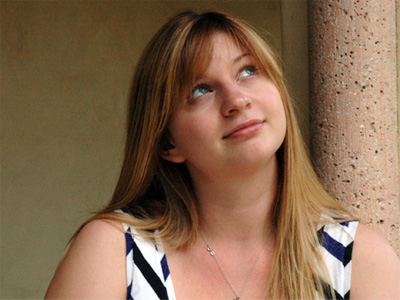 Admitting that she “often cursed the assignment” and “lost a lot of sleep,” Elizabeth DeGori (’10), a dual major in Politics and International Relations and French Studies from Las Vegas, nevertheless values the experience of writing a thesis. “I learned how to articulate a single argument over many chapters by bringing out the nuances in one simple sentence. I now know I can write hundreds of pages in a few weeks, and I’m all about tearing down the walls of what you thought you could do to find out how much more there is.”
Admitting that she “often cursed the assignment” and “lost a lot of sleep,” Elizabeth DeGori (’10), a dual major in Politics and International Relations and French Studies from Las Vegas, nevertheless values the experience of writing a thesis. “I learned how to articulate a single argument over many chapters by bringing out the nuances in one simple sentence. I now know I can write hundreds of pages in a few weeks, and I’m all about tearing down the walls of what you thought you could do to find out how much more there is.”
Elizabeth will be presenting her thesis, “U.S., E.U. and Chinese Domestic Interests in International Policy and Their Interactions: Creating an Atmosphere for Climate Action at Copenhagen?,” on Capstone Day before the Scripps campus community. Her topic emerged out of an internship she served in Paris last spring, when she researched climate change policies under the Obama administration and how they could work with the EU’s to come to an ambitious agreement at the 2009 U.N. Climate Change Conference in Copenhagen.
“I expanded on that to include China as a major player in the negotiations,” explains Elizabeth. “One of the things I liked about my topic was that it was very current and about an issue of vital importance in all of our lives. I hope it will encourage thought about the very real obstacles to climate action, which are more about the necessary political will than anything else.”
Never one to shy away from a challenge, Elizabeth chose to complement her study of politics by pursuing French Studies partly because “I have always been pretty bad at languages, so the real explanation is: I’m stubborn.” She spent a year abroad in France and succeeded due to sheer determination, rather than any inborn talent.
“I took classes from Sciences Po Paris, a fairly prestigious school for politics in Paris,” Elizabeth recounts. “I did them in French with other French and international students, often feeling that I was at the lower end of the class, but you don’t grow from constantly doing well. I succeeded because, while I did less well than I did in English, I used all of my energy to attempt to understand, and that’s what made the difference. Maybe my best efforts didn’t allow me to be the best in the class, but the overall experience is about progress and pushing boundaries back each time you run up against them. (And hey, those other students were already fluent!)”
While she is waiting the results of several fellowship applications she has submitted, Elizabeth thinks, “it would be a nice concept to take a little time to rest after all of this, but it’s more likely that I will use the next couple of weeks to work out something concrete. The one thing I do know is that I’m hoping to spend at least a few months in China next year to work on my slowly developing Chinese. If there’s one thing I’ve learned, immersion is everything.”
Clearly Elizabeth isn’t letting her lack of foreign language skills hold her back.
One of her thesis advisors, French professor Thierry Boucquey, describes Elizabeth’s growth during her years at Scripps: “Liz went from being an ambitious, very hard working student in my headline news class to becoming an accomplished senior who participated as a delegate to the Copenhagen convention on climate change and wrote an outstanding thesis.”
“My best experiences have always been the things I challenged myself to do,” she explains, “kicked myself for actually deciding to do them, but in the end was delighted that I took a chance instead of thinking I couldn’t do them for one reason or another.”

